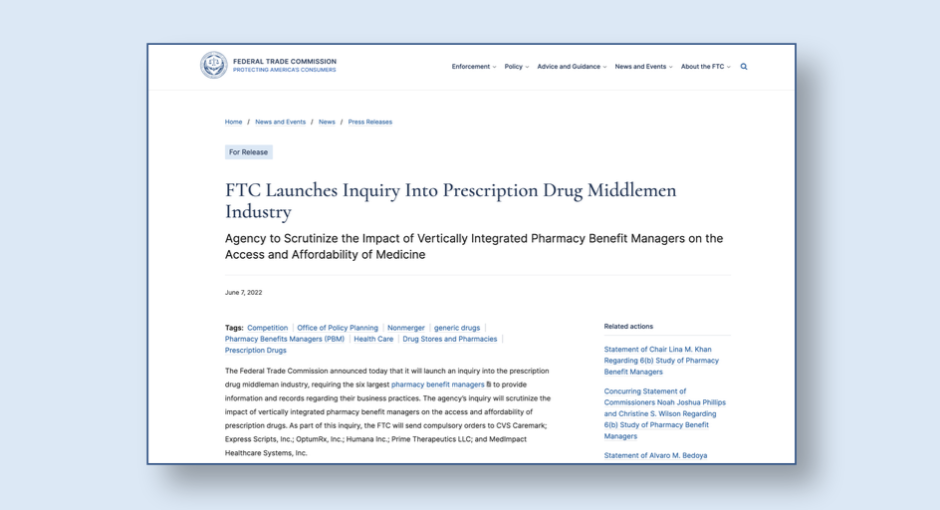Just months after deadlocking, the U.S. Federal Trade Commission voted unanimously on Tuesday to launch an investigation into pharmacy benefit managers’ business practices to assess their impact on prescription drug access and affordability.
Groups that represent 340B health care providers told the commission during a recent public comment period that PBMs’ discriminatory policies hurt the providers’ missions to serve vulnerable patients.
Twenty-one states have passed laws prohibiting PBM discrimination against 340B covered entities. A bipartisan U.S. House bill, the 340B PROTECT Act, would address alleged discriminatory PBM practices against 340B providers. Support for the bill has recently grown to 94 co-sponsors.
FTC said in a June 7 press release its probe will require the six largest PBMs—CVS Caremark, Express Scripts, OptumRx, Humana, Prime Therapeutics, and MedImpact Healthcare Systems—to turn over information and records on their business practices to the agency for review. They have 90 days to comply.
Specifically, FTC said it would examine whether PBMs’ integration with large health plans and wholly owned mail-order and specialty pharmacies gives the alliances too much control over pricing, distribution, and dispensing of prescription drugs.
“[PBMs] often have enormous influence on which drugs are prescribed to patients, which pharmacies patients can use, and how much patients ultimately pay at the pharmacy counter,” FTC Commission Chair Lina Khan said in a June 7 statement. “Many of these functions depend on highly complicated, opaque contractual relationships that are difficult or impossible to understand for patients and independent businesses across the prescription drug system.”
PBM trade group Pharmaceutical Care Management Association issued a statement June 7 in response to the FTC’s announcement. “We are currently reviewing the revised study approved today by the FTC,” PCMA President and CEO J.C. Scott said. “We are confident that any examination … will validate that PBMs are reducing prescription drug costs for consumers.”
PCMA said drug maker “price-setting,” not PBM practices, are the root cause of high costs. “The most effective study of issues around drug costs for consumers would examine the entire supply chain,” PCMA argued. “PBMs are holding drug companies accountable by negotiating the lowest possible cost on behalf of consumers, and by driving and delivering local competition that consumers are demanding.”
The trade association said PBMs are the only sector across the prescription drug supply and payment chain that is working to rein in costs.
FTC’s move comes on the heels of a 13-week public comment period that closed May 25. Groups whose members include 340B entities told the commission that PBMs cut entities’ drug reimbursement, exclude entities’ pharmacies from PBM networks, and steer patients to PBM-owned pharmacies.
In its statement, FTC said its probe would target PBM practices including fees and clawbacks charged to pharmacies; potentially unfair audits of independent pharmacies; “complicated and opaque methods to determine pharmacy reimbursement”; the prevalence of prior authorizations and other restrictions; the use of specialty drug lists; and the impact of drug maker rebates and fees on formulary design and costs.
FTC said it received more than 24,000 public comments in response to its Feb. 24 request for information.
340B Stakeholders Continue to Weigh In
The National Association of Community Health Centers submitted its comments on May 25.
“Over the last few years, PBMs have instituted a number of aggressive business practices to steal our 340B savings and increase their profit margins,” NACHC said. “Discriminatory reimbursement not only subverts the purpose of the federal laws by transforming them into a subsidy for for-profit middlemen, but also deprives safety net providers of the savings and revenue they desperately need to support services to low-income patients and other vulnerable populations.”
NACHC said PBMs
- reimburse 340B pharmacies at lower rates to pick 340B savings out of health centers’ pockets
- prohibit 340B health center pharmacies from classifying as retail pharmacies
- force pharmacies to comply with onerous prescription claims identification requirements.
“PBMs’ greedy business practices to generate higher manufacturer rebates are negatively impacting health centers’ ability to receive 340B priced drugs at contract pharmacies,” NACHC said.
“Without federal oversight, health centers are at the mercy of PBMs, suffering daily consequences due to unequal bargaining power,” NACHC said. “We strongly urge to FTC to issue regulations that will create regulatory protections for providers and patients to stop PBMs’ anticompetitive practices and provide an avenue for recourse to hold vertically integrated PBMs responsible.”
In previous issues of 340B Report, we have reported on feedback from other 340B provider groups that submitted comments to the FTC.
Commissioners Reach Consensus
FTC commissioners voted 5-0 in favor of a launching the PBM inquiry. In February, when one Democratic seat was vacant, the commission split 2-2 along party lines on whether to start a probe. Democratic nominee Alvaro Bedoya was confirmed by the U.S. Senate in May.
The two GOP commissioners who voted against an investigation in February said they voted for one now because the last study design “was hastily prepared.”
“We opposed issuing that study,” they said. “This one is different. … This is a study we can support.”


